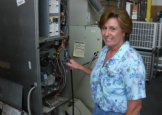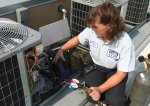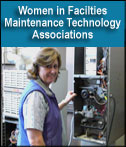
"This is definitely an area where women can excel. It takes brain power, |
|
Career Path: Depending on their experience level, graduates often begin in entry-level positions, where they are exposed to a broad range of tasks and responsibilities. As they learn and apply new skills after three to five years, they may move into lead positions. In larger settings, management opportunities may also be available. Some students who enter the facilities maintenance field later move into work as biomedical technicians in hospitals, where a higher percentage of women are currently employed. Some students who already hold down a facilities maintenance position may also enter the program to learn more about the field and enhance their skills on the job.
Nature of the Work: Entry-level facilities maintenance crew members may do a little of everything. Initial tasks might include changing filters, checking oil levels, looking for pumps that have shut down, checking for broken equipment, greasing motors and bearings, changing the fluorescent bulbs, working with toilet flushometers (a device for flushing toilets that uses less water), painting, carpentry, and plumbing. Crew member with more highly developed skills may advance into more complex projects including leadership and project management roles.
On a larger building crew, workers tend to specialize in areas such as electronics (handling fire alarms and communications), electrical (handling power distribution systems), or with heating, ventilation, air conditioning, and refrigeration (HVACR). Workers may also handle chemicals used for cleaning and other maintenance tasks.
Work Environment: Any industry that has a building, even if it is a vacant location, may require facilities maintenance staff. The positions available are quite varied in nature. Some people may work at a computer operating remote building management control devices, which regulate energy requirements and building environments. Others might punch tubes out of the condenser, which is a very dirty job. Since all of the building systems require maintenance, hands-on work could include electricity, plumbing, communications systems, fire alarms, heating, air conditioning and ventilation equipment, and landscaping.
Work locations may include outdoor rooftop areas, outdoor maintenance and landscaping areas, upper and lower mechanical rooms (fans, boilers, hot water heaters and pumps), and indoor locations where carpentry, plumbing, light electrical, and other tasks are performed.
In-house crew members remain at a single location, while technicians who work for installation and repair companies may be dispatched to several building locations during the course of their day.
Specific Jobs Available to Graduates: Graduates of both the certificate and A.S. degree have many career alternatives:
The following list indicates fields which may be open to graduates of SJCC's GIS program:
- In-house facilities maintenance staff in commercial building (On a larger crew, specialization in a particular craft such as electrical, communications, HVACR, or plumbing is likely)
- Residential facilities maintenance, including condominiums
- Installer or repair person for a service company
- Salesperson for building systems and equipment
- Administrator taking service calls and arranging repairs in commercial real estate or residential facilities
Initial job opportunities with the A.S. degree and a certificate are comparable, although a degree may add to the potential for promotions. Those with degrees and a few years experience also will be asked to serve as leads, oversee jobs, and define the scope of work for projects. The degree also makes graduates more competitive for eventual management jobs and for the teaching profession.
Industries Employing Graduates of this Program:
Several industries employ graduates of the Facilities Maintenance Technology program:
- Any company with large buildings that require maintenance, including both commercial and residential buildings
- Service industries which install or repair equipment in buildings
- Industries which sell HVACR, plumbing, communications, electrical, and other equipment used in large buildings
- Construction industry
- Real estate companies which manage large properties
San Jose City College (SJCC) has developed strong relationships with industry partners via its advisory board, former students who are now employed at companies, and local unions. Graduates of the HVACR and Facilities Maintenance Technology programs at SJCC have obtained employment with Equity Office, Cold Craft, Inc., the Morgan Hill Unified School District, Wyse, Telewave Inc, BO Enterprises, East Side Union High School, Xilinx Semi Conductor, the Veteran's Hospital of Palo Alto, Golden Gate Mechanical, AAA Furnace & Air Conditioning, Alton Air & Heating Inc., Pacific Cooling and Heating, Cushman and Wakefield, EBay, Jones Lang LaSalle, and the cities of San Jose, Los Gatos, and Hayward.
Course Description:
Degrees or certificates offered:
- Certificate of Achievement Level 3 in Facilities Maintenance Technology (36 units)
- A.S. degree in Facilities Maintenance Technology (61 units)
This course prepares graduates to install, operate, monitor, maintain and troubleshoot mechanical and electrical equipment in large commercial facilities ranging from operating rooms, hotels, commercial and residential buildings to clean rooms.
Content covered in basic instruction (40 units):
- Electrical Principles for Air Conditioning/Refrigeration
- Refrigeration Principles
- Air Conditioning Work Experience
- Air Conditioning Control Systems
- Introduction to Facilities Operation
- Electrical/Electronic Systems
- Boiler Procedures
- Introduction and Intermediate Programmable Logic Controllers
- Introduction to Industrial Electronics and Controls
- Low and High Pressure Boilers
- Math for Technicians
- Construction Blue Print Reading, Estimating, Codes & Specifications
- Introduction to Computer Information Systems
Visit the Facilities Maintenance Technology website and view the course catalog for more information.
Prerequisites:
This program has no prerequisites.
Hours Offered:
The Facilities Maintenance Technology program offers an accelerated day program, with three
classes offered three days a week from 8:30 a.m. to early afternoon. Evening classes are
always available. There are also occasional afternoon classes in the major.
For those students pursuing a degree, many general education courses are offered online and on weekends. Class offerings vary by semester.
Length of Program:
The certificate program requires 36 units.
- Most students complete the program in two years, but it can be finished sooner with the accelerated program.
The A.S. degree program requires 61 units.
- Most students complete the program in two years, but it can be finished sooner with the accelerated program.
"The facilities maintenance industry is growing by leaps and bounds - trying to keep skilled personnel ready, available and trained in its diverse facility applications. This program provides women the opportunity to enter into a field that has massive growth potential - not limited to just maintenance of facilities but future inclusion into automated building systems, safety and industrial hygiene and then into management after your years of experience and education prove invaluable. Women will find a variety of daily responsibilities, from simple to complex, which will catalyze them on their professional career path."
Financial Aid Contact
Tutoring:
Learning Resource Center
Room L-105
2100 Moorpark Avenue
San Jose, CA 95128
(408) 298-2181 X 3312
Learning Resource Center Website
A small amount of preparation can help make your days in the classroom go more smoothly. Visit the CalWomenTech Learning Library to find software and other tools to advance your math, spatial reasoning skills and much more. Visit the Tutoring Center to find out how tutoring can help.
 Copyright 2010 National Institute for Women in Trades, Technology & Science | http://www.iwitts.com |




